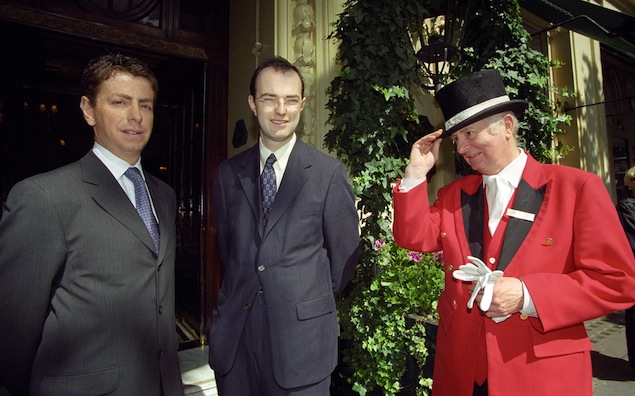Calm • Serenity
The Pursuit of Calm
Nowadays, almost all of us wish we could be calmer. It’s one of the distinctive longings of the modern age. Across history, people have tended to seek out adventure and excitement. But most of us have had a bit too much of that now. The desire to be more tranquil and focused is the new, ever more urgent priority.
In our view, there are eight basic causes of agitation – and the path to greater calm involves attempting to consider each one systematically and returning to it on a regular basis.
One: Panic about Panic
A lot of agitation is caused by an unrealistic sense of how unusual difficulty is. We are oppressed by unhelpful images of how easy it is to achieve and how normal it is to succeed. The stories that officially circulate about what relationships and careers are like tend fatally to downplay the darker realities, leaving many of us not only upset, but upset that we are upset, feeling persecuted as well as miserable.

If your life is rather more difficult than this saccharine image, it must be that you are a freak or a failure
We need to change our points of reference about what life is like. We need – in the broadest sense – better art, a kind that takes us more truthfully into the realities of relationships, the workplace and our 3am panics. We need to make sure we are surrounded by accurate case studies of the ordinary miseries of daily life.

The Agony in the Kitchen, Jessica Todd Harper, 2012
Consider this helpfully realistic picture of the life of a couple. Many things are going well for them. Earlier one of their children showed them such a sweet drawing she’d done at school. They had a nice holiday last year. They love playing soccer together in the park (the mum gets really competitive and has discovered she’s a brilliant goalkeeper). They are trying to work out whether to move to a village outside the city. Sometimes they feel so close. But this evening is a nightmare. She received a flirtatious email from an ex-boyfriend of years ago; she hasn’t shown it to her husband, but it’s on her mind as a source of torment. It’s opened up imaginative possibilities. She has put her head in her hands – but he’s said twenty times that drives him nuts. His mother used to do that. Their marriage is OK. They’ve been together nine years. They’re going to survive long-term, but right now, they’re about to have a titanic fight. He’ll call her a bitch and slam the door, but he’s quite nice – genuinely…
We should contemplate this image to reduce panic about our relationships. Difficulty is normal. Very decent couples have long-running and extraordinarily vicious conflicts over apparently small things. In a good relationship, two nights out of five you will wonder what you are doing together. That is success. It’s worth repeating: two bad nights a week is lucky.
The French 18th-century philosopher Chamfort wisely observed: ‘A person should swallow a toad every morning to be sure of not meeting with anything more revolting in the day ahead.’ Disgusting things are on the menu for all of us. Life, it seems, is – in many ways – about quite a lot of suffering.
Look at this image by the Spanish painter Velázquez. Christianity is upfront about the idea that our lives will be burdened by suffering. You don’t have to believe in the religion (we don’t) to recognise there’s something important at play here. Christianity takes the view that loss, self-reproach, failure, regret, sickness and sadness will always find ways of entering life. Our troubles need practical help, of course. But Christianity identifies another need as well: for our suffering to be recognised as normal.
This picture of the Crucifixion universalises suffering. The painter shows a good – indeed perfect – man being humiliated, injured and ultimately killed. He invites us to contemplate the centrality of suffering in the achievement of all valuable goals. Rather than concentrate on the moment of fulfilment – when one feels the joy of success – he directs our attention to the times of hardship and sacrifice and says they are the most important, the most deserving of admiration.
Such dark images strengthen us a little – and offer valuable consolation – for the hard tasks of our lives.
Two: Taking too much responsibility
We over-personalise our fates, taking too much credit in the good times, and then, too much blame in the bad ones.
It’s tempting to take all the credit when there is a triumph. But the corollary is that we are entirely to blame when we are humiliated and beaten.

We are particularly prone to over-personalisation when it comes to money. To keep our agitation in check we should embrace an economic perspective that allows us to see ourselves as operating within a huge system loosely designated as ‘Capitalism’. Regular contemplation of an image of the New York Stock Exchange reminds us that the way the world works is not our own doing. Powerful forces sweep over whole industries, condemning some to decline, while raising others to remarkable (if unstable) prosperity. The key point is: much about your fate is not your own work. You did not invent the world. You are not personally entirely responsible for your condition. The suffering is real, but remember that it is less personal than we tend to suppose.
This is a statue of the Roman goddess of Fortune. The Romans knew her as ‘Fortuna’. She was to be found on the back of most Roman coins, holding a cornucopia in one hand and a rudder in the other. She was beautiful and usually wore a light tunic and smiled attractively. The cornucopia was a symbol of her power to bestow favours, but the rudder was a symbol of her more sinister power to change destinies, just like that. She could scatter gifts (a love affair, a great job, beautiful children), then with terrifying speed shift the rudder’s course, maintaining a chilling smile as she watched us choke to death on a fishbone, disappear in a landslide or go bankrupt in a credit crisis.
The goddess of Fortune remains a useful image to keep our exposure to accident, luck and fate continually in our minds; she conflates a range of threats to our security into one ghastly anthropomorphic enemy.
Not everything that happens to us occurs with reference to something about us. Our romantic or professional failure does not have to be read as retribution for some sin we have committed, it is not always rational punishment handed out after careful examination of all the evidence by an all-seeing Providence in a divine courtroom; it may be a cruel, but morally meaningless, byproduct of the machinations of a rancorous goddess. The interventions of Fortune, of ‘luck’, whether they are kindly or diabolical, introduce a random element into human destiny.
To be calm, we must reduce the weight of our proud and unrealistic modern individualism.
Three: Being too Hopeful
A major source of agitation is, strange as it might at first sound, optimism. The expectation that things will go well creates anxiety because, at some level, we know that we can’t quite count on our hopes coming to fruition. And of course, as things turn out, quite often they don’t. We are on tenterhooks – and we suffer.
To restore calm we need to become strategically pessimistic. That is, to spend more time getting used to the very real possibility that things will work out rather badly. A lot of good projects fail, most things go wrong, at least half our dreams won’t work out. Pessimism dampens unhelpful and impatient expectations.
It is hope – with regard to our careers, our love lives, our children, our politicians and our planet – that is primarily to blame for angering and embittering us. The incompatibility between the scale of our aspirations and the reality of life generates the anxious disappointments which spoil so many days.
There are some extremely helpful pessimists in the history of philosophy, waiting to cheer us up. The French philosopher Blaise Pascal stands out for the exceptionally therapeutic nature of his gloom.
In his book, the Pensées, Pascal misses no opportunities to confront his readers with evidence of how badly things normally turn out. In seductive classical French, he informs us that happiness is an illusion (‘Anyone who does not see the vanity of the world is very vain himself’), that misery is the norm (‘If our condition were truly happy we should not need to divert ourselves from thinking about it’) and that we have to face the desperate facts of our situation head on: ‘Man’s greatness comes from knowing he is wretched’.
Given the tone, it comes as something of a surprise to discover that reading Pascal is not at all the depressing experience one might have presumed. The work is consoling, heartwarming and even, at times, hilarious. For those teetering on the verge of despair, there can paradoxically be no finer book to turn to than one which seeks to grind man’s every last hope into the dust. The Pensées, far more than any sentimental volume touting inner beauty, positive thinking or the realisation of hidden potential, has the power to coax the suicidal off the ledge of a high parapet.
There is relief, which can explode into bursts of laughter, when we finally come across evidence that our very worst insights, far from being unique and shameful, are part of the common, inevitable reality of mankind. Our dread that we might be the only ones to feel anxious, bored, jealous, cruel, perverse and narcissistic turns out to be gloriously unfounded, opening up unexpected opportunities for communion around our dark realities.
We should honour Pascal, and the long line of pessimistic philosophers to which he belongs, for doing us the incalculably great favour of publicly and elegantly rehearsing the facts of life.
This is not a stance with which the modern world betrays much sympathy, for one of its dominant characteristics, and certainly its greatest flaw, is its optimism.
Despite occasional moments of panic, most often connected to market crises, wars or pandemics, the secular age maintains an all but irrational devotion to a narrative of improvement, based on a messianic faith in the three great drivers of change: science, technology and business. Material improvements since the mid-18th century have been so remarkable, and have so exponentially increased our comfort, safety, wealth and power, as to deal an almost fatal blow to our capacity to remain pessimistic – and therefore, crucially, to our ability to stay calm. It has been impossible to hold on to a balanced assessment of what life is likely to provide for us when we have witnessed the cracking of the genetic code, the invention of the mobile phone, the opening of Western-style supermarkets in remote corners of China and the launch of the Hubble telescope.

Yet while it is undeniable that the scientific and economic trajectories of mankind have been pointed firmly in an upward direction for several centuries, we do not comprise mankind: none of us individuals can dwell exclusively amidst the ground-breaking developments in genetics or telecommunications that lend our age its distinctive and buoyant prejudices. We may derive some benefit from the availability of hot baths and computer chips, but our lives are no less subject to accident, frustrated ambition, heartbreak, jealousy, anxiety or death than were those of our medieval forebears. But at least our ancestors had the advantage of living in pessimistic times which never made the mistake of promising its population that happiness could ever make a permanent home for itself on this earth.

It’s worth adding that a pessimistic worldview does not have to entail a life stripped of joy. Pessimists can have a far greater capacity for appreciation than optimists, for they never expect things to turn out well and so may be amazed by the modest successes which occasionally break across their darkened horizons. It’s quite possible to be both pessimistic and, day to day, a real laugh.
Four: We don’t know what we are bothered about
We don’t like admitting it but quite often we don’t really know what it is that has caused us to get so agitated. It can feel like an insult: we are upset and we don’t know why. But really it is a helpful thought. Finding out the real cause is the key to bringing relief: unanalysed frustration is the root cause of rage; we need to work on repatriating our emotions.
Let’s imagine an explosion of annoyance of the dishwasher being left in a mess by one’s partner. One starts to shout at them, complaining all the time of ‘the chaos.’

But though one’s anger has locked on to the state of the dishwasher, perhaps the root cause lies elsewhere, for example, in a tense situation at work, or in an unresolved discussion about sex from the night before.
The way to calm is through analysis. We need to spend time on self-knowledge. We have to try to isolate the genuine cause, which might lie quite far from the surface eruption. The pursuit of calm isn’t about making every single moment perfectly tranquil. It’s to prevent agitation turning into catastrophe – which involves a constant effort to take apart moods of anxiety in order to pinpoint their real causes.
Five: Capitalism and False Glamour
It is inbuilt in capitalism that the best things in life cannot be the free ones. On the contrary, capitalism is keen to tell us things which are inexpensive cannot be much good and that everything worth having costs a lot of money – more than you have.
This is a profound cause of lack of calm in our lives. It means that we are continually agitated by the worry that we can’t afford the things that will make us happy. It’s a very understandable anxiety. But it is unhelpful – and based on a falsehood. We need to remind ourselves – on a regular basis – that inexpensive, simple things may often have much more to offer us. Ideally, a large part of modern culture would support us in that calming endeavour. But, for the moment, it is something we have to do for ourselves, with the assistance of some impressive allies.

This beautiful bowl is telling us a helpful thing: that things that are precious in their meaning and visual appeal needn’t be financially precious – and this is very good news in a world where hardly anyone has lots of money. It is one strand of how we can deal better with consumerism, disrupting the linear relationship between expense and goodness.
Though this particular bowl is in an art gallery – and would cost a fortune to buy – it’s not much different (and certainly no better) than one we might pick up cheaply in Ikea.

One of the heroes of appreciating the real worth of simple, inexpensive things is the 18th-century French painter Jean-Siméon Chardin
Everything here is simple and modest. And wonderful. Someone preserved the apricots last autumn. It didn’t cost much to do that – at least not in financial terms; what it took was care and patience. The wine glass on the left wasn’t expensive – but the design is just right. The cup is pretty, and adds a cheerful touch of colour. Most junk shops have a few quite like it. The package on the right has been tied with style, but brown paper and string won’t break the bank. The knife is second hand; it’s got a nice handle.
The Chinese bowl and the painting are helpful correctives to the pressure of glamour – which tries to push us in the opposite direction, making us feel we can’t love our lives unless we are doing the fashionable, expensive thing.
The media is constantly defining the good life in a way that makes it inaccessible to most people. This is extremely unhelpful and untrue, for it turns out that – more wisely considered – many lovely things are, in fact, within our reach. A capacity for appreciation, not money, is the key to a certain kind of calm.
Six: The Promotion of Kindness
Fear of humiliation is a fundamental cause of anxiety. And it is based on our assumptions of how other people will react to us in difficult situations. The worry – of course – is that they will be harsh and mean. Our failings and imperfections will be met with mockery or indifference.

A lot of our agitation stems from the fear of the nastiness of others. So a world in which people are nicer is going to be helpful in a very particular way: it will reduce the fear of failure and humiliation.
This realisation takes some of the weight off ourselves. Anxiety about appearance need not be vanity – and hence something that we should berate ourselves for. In fact it is usually caused by the readiness of others to judge on appearances. Worries about status are not the product of our own shallow and crude materialism. They are the logical response to the way in which decent treatment is unfairly handed out.
People who might belittle you for actually unimportant reasons are, themselves, fraught with insecurity. They threaten to attack because they are so fearful that others will mock them. The promotion of kindness lessens the level of fear of others which circulates in society.
Seven: Perspective in Space
We naturally exaggerate our own importance. The incidents of our own lives loom very large in our view of the world. Yet, really, we are minute and entirely dispensable. The world would trundle on much the same without us. It is very helpful to be reduced, from time to time, in our own eyes because this calms the urgent, disturbing (and very normal) sense that it really, really matters what we do.

On an evening walk you look up and see the the planets Venus and Jupiter shining in the darkening sky. If the dusk deepens you might see some stars – Aldebaran, Andromeda, Aries and many others. It’s a hint of the unimaginable extensions of space across the solar system, the galaxy, the cosmos. The sight has a calming effect. Because none of our troubles, disappointments or hopes have any relevance. Everything that happens to us, or that we do, is of no consequence whatever from the point of view of the universe. For a little while our own lives seem unimportant. But it is not a personal affront. The same applies to everyone: it is levelling, humbling.
A related benefit can be drawn from the contemplation of life going on in places far from where we are. If you don’t happen to live in the vicinity, you might be soothed by news from Puerto Montt in Chile.

Puerto Montt
It lies on the Pacific coast, a two hour flight south of the capital, Santiago. It has a population of 155,000. The weather is mild all year round, though it occasionally freezes in winter. The salmon breeding industry has not been doing well there in recent years. The local soccer team, Deportes, plays in the national Segunda División (they finished seventh last season). There’s a large Unimarc shopping centre near the bus terminal. A bayside restaurant, La Kosina Folkbar, has an excellent reputation for fish and steak.
The menu today at La Kosina Folkbar
And the people of Puerto Montt, of course, might benefit from contemplating the minor, daily events of the South London suburb of Norwood, or Newark in Delaware, or the Nerima district of Tokyo.

A soothing image – for the residents of Puerto Montt
It is, essentially, a reminder that life can be lived perfectly well in ways that are quite different from our own. The resentments, longings and ambitions which agitate our days might have very little meaning elsewhere. The totems of local status become ridiculous when seen on a global scale. Sending one’s children to Kambala High School obsesses some parents in Sydney, but has zero cachet in Patagonia. A resident of Glasgow might fret for years paying a big mortgage for the privilege of living in Milngavie. Yet, from a distance, this suburb has no status at all.
We need to be reminded of how little weight our concerns would have when seen from almost anywhere else, for the kindly reason of reducing our anxiety and helping us feel a little calmer about our lives.
Eight: Perspective in Time
While the tower of this church in the tiny village of Helmingham was being built, Columbus reached the Caribbean. Stone masons climbed ladders to shape the upper windows while Leonardo da Vinci was experimenting with flying vehicles. Carpenters fitted the beams on the roof as Granada, the last Muslim stronghold in Spain, fell. To spend time there is to be reminded – in a very touching and helpful way – of how tiny our existence is in the larger fabric of history.

Just as the expanses of space and geography offer a valuable perspective that takes us out of our local preoccupations, so too the encounter with things that are very old can have a moderating, tranquilising effect.
We should regularly seek out places that speak to us of the extended passage of time. But it’s not enough merely to be in the place. It’s important to actively consider the scale of history, to make oneself think of how much has happened, of how the world has changed. And from there, one is better placed to return to the unavoidable demands of the present.
Distressing levels of agitation are normal. The pursuit of calm is not a way of avoiding engagement with the challenging and difficult parts of existence. An ideal society would systematically calm us down by installing the eight strategies we have discussed over the past few days. Until then, we have to take responsibility for ourselves.






























